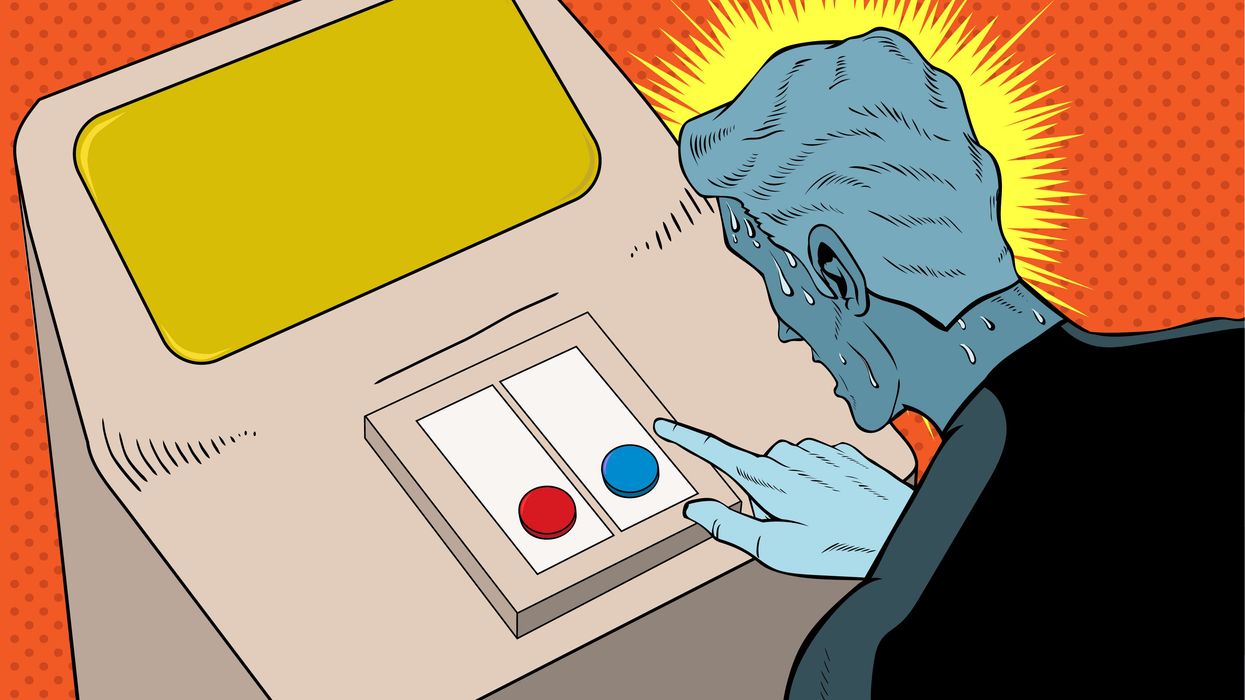
yogysic/getty

During President Trump’s ascendancy, internet culture reporting was preoccupied with one thing: meme magic. Forces like /r/thedonald and Pepe the Frog became infused with occult power, so powerful it could change the course of history. Even scandals like Russiagate or the then-ubiquitous accusations that this or that politician or public figure was secretly a Nazi were underpinned by this belief in the ineluctable power of memes. Your Boomer mother need only see repeated posts by Russian trolls across her favorite social media platforms to have her entire worldview changed. That’s the magic.
Of course, I’d be remiss not to argue that perhaps meme magic or, even more evocatively, memetic warfare is just propaganda by another name, updated for the digital age. The magic that feels intrinsic to memes is the magic that’s in all mass media. Why do memes matter? Because they’ve always mattered, and as Chris Gabriel, the man behind the iconic YouTube channel MemeAnalysis knows too well, that’s frighteningly easy to forget.
Katherine: Can you explain what MemeAnalysis is?
Chris: MemeAnalysis is a YouTube channel, but it’s also a philosophy that can be summed up with the mantra, “Memes matter.” Through both this philosophy and my channel, I perform a symbolic analysis of memes and the internet in general to gain insight into the collective psyche.
Katherine: Who are your major influences?
Chris: Carl Jung and Aleister Crowley both provided my major analytic tool kits, while the vulgar and funny focus on tech and viral images is from William S. Burroughs.
Katherine: Do you think YouTube is an effective way to connect with an audience?
Chris: I find YouTube has been deeply effective and ineffective at different times. I prefer Instagram and Substack.
Katherine: You’re also on TikTok – what’s your read on that?
Chris: TikTok has the most effective algorithm in social media, bar none. As for the psychic implications, it’s like an acid that burns your nerves, so you’re numbed as your flesh dissolves. TikTok is corrosive to the psyche. But yes, it’s one of my favorite mediums for MemeAnalysis.
Katherine: There's a lot of talk about how we live in a fragmented culture and there’s no mainstream left. Do you think that’s true?
Chris: In some ways, the illusion of pop culture has been undone, but in other ways, there are far fewer unique subcultures. All these fragmented cultures behave in a single way; there are only a few memetic personalities with innumerable costumes.
Katherine: Your work deals a lot with mythmaking, and I know that you’re trying to construct a “myth of the internet.” Why do you think myths are meaningful?
Chris: Myth is the most effective means for spreading esoteric truth and for understanding deeply complex phenomena. The lack of a unifying internet narrative has been disastrous. It’s something many people do constantly but lack any meaningful language to describe what it is that they’ve experienced. My myth of the internet focuses on the sort of phantasmagoric “location” of the internet, as a fairyland or dark woods, as a labyrinth or a spider’s web, etc. And further on the entities and archetypes that inhabit this space, monsters and heroes.
Katherine: We live in an era that both embraces labeling and eschews stereotypes. Do you think there’s a contradiction there?
Chris: In some ways the popular phrase “do not perceive me” explains both perfectly. The label is a defensive armor against legitimate self-awareness and individuation. The stereotype is the perception of said label, which, in perceiving, wounds deeply. Young people want labels to be accepted, to be “validated” but unseen by the critical eye.
Katherine: To my mind, it feels like astrology has replaced the role archetypes or even fables used to play in our culture. What’s your take on astrology?
Chris: Astrology is one of the most primal systems. It forms some of the oldest archetypes and informs nearly all fable and fiction. While the modern form is vulgar, it still aims at the truth. I like it; it’s fun to talk about.
Katherine: Tarot has become wildly popular, but it seems like people don’t so much appreciate the art form as want a quick remedy to uncertainty. Do you think that’s true?
Chris: Having read tarot for seven years now, I’ve gotten a pretty good grasp of the “type” that enjoys divination: That type is everyone. Everyone has an innate desire to talk about themselves, to express their pains and desires. Tarot, and all divination, is a medium for this.
The esoteric truths and the revelations are gained through this rather mundane game. While I utilize more personal and occult forms of divination in my inner circle, it’s still the joy of sharing secrets and doing “magic” with people that keeps me at it.
Katherine: Of anyone I know, you’re one of the most vocal about the spiritual dangers of the internet. Do you think we can use the internet healthily?
Chris: The key is will and intention. There is nothing worse than mindless internet use. If it is used with clarity of consciousness, it remains a weapon to be wielded in one's own service.
Katherine: Would you say you’re optimistic or pessimistic about the role of tech in our future?
Chris: I’m generally optimistic. I think we are in a period of severe growing pains, of a sort of aeonic war between the old and new. Technology is both the battlefield and the weapons. The new will win, and tech will serve a great purpose in the future.
Katherine Dee
Contributing Editor, Return